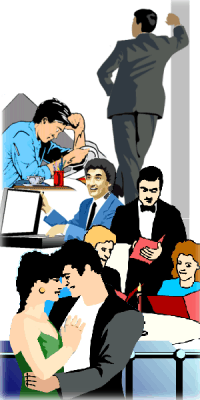

At our meeting on November 19th, 2000, Ms. Barrow brought us on an interactive exploration of what is involved in communication, and how different circumstances can affect our speech. She has very kindly put together this detailed report of the meeting.
Reproduced here with the permission of the author
 Introduction
Introduction
 |
The overall aim of this session was to explore practical ways to maximise communication abilities when one has Parkinson's Disease. It did not address the technical aspects of speech. The session was interactive, with a number of things being discussed within the group, which included the following: |
 Communication Abilities
Communication Abilities | |
|
Our ability to communicate is extremely complex and involves many different things that include speech itself, the ability to understand, tone of voice, silence, facial expression, body language, the way we dress, the personal distance we have from one another as well as the clarity, speed and volume of speech. Each one of us combines these facets of communication in different ways, to form an overall 'communication package' unique to each individual. It is what makes each of us different from one another. Different situations will demand slightly different 'packages', and the person to whom we are talking will also affect how we communicate. For example, our style of communication would be very different with potential employers, compared to with a group of friends at the pub. In the everyday run of things we take this ability to communicate for granted, and it is only when things go wrong that we begin to realise the complexity of the process, and how our ability to communicate provides us with a key to many aspects of daily living. Parkinson's Disease can affect both verbal and non-verbal aspects of communication.
|
 Factors that Make Communication Easier:
Factors that Make Communication Easier:There were a number of factors that the group identified as making communication easier. These included:
- Being in an "On" period (i.e. when medication is working well)
- Being accepted and understood by others.
- Talking in a one to one situation.
- When the other person's communication style was "calm, relaxing and accepting".
- When the other person had patience and listened well.
 Factors that Make Communication More Difficult:
Factors that Make Communication More Difficult:There were a number of factors that the group identified that made communication more difficult. These included:
- Having an "Off period" (i.e. when medication was wearing off.
- Stress.
- A feeling of being watched.
- Being in a group situation.
- When people were unaware that you had Parkinson's Disease.
- When there was pressure to get something out in time/quickly.
- The stress associated with trying to be heard.
- The other person's communication style (e.g. impatient, not listening).
 Ideas to Maximise Communication Abilities:
Ideas to Maximise Communication Abilities:There then followed a discussion on what things might help to maximise communication abilities, given the challenges of the contexts in which we all communicate. A number of ideas were put forward, and these included:
- Reducing stress by telling the other person that you have Parkinson's Disease
(either verbally or giving them a special card), giving yourself time, dressing well.
- Public awareness was considered important as a means of gaining a more general acceptance
of Parkinson's Disease with all groups of people. Such awareness would go some way towards
ensuring that the people you meet are understanding, and will give you more time to say what
you want.
- Speaking loudly and more slowly were also identified as helping speech, but were difficult to put into practice. The fact that it can be difficult to monitor your own speech was discussed. If you speak more loudly it may feel that it is too loud for the situation, when in reality it is quite acceptable. This makes it difficult to continue to speak at that volume.
- It may be useful to "test-drive" different loudness levels with someone you trust, to get an idea of what loudness level sounds 'normal', even though it may feel too loud. This would then give you more confidence to speak loudly in different situations. To speak loudly and slowly, you need to have sufficient breath support, so it may be helpful to take a good breath in before you start.
 Some Specific Ideas:
Some Specific Ideas:Some specific ideas were identified that the group could address in the future. These were:
- Developing and designing a card giving some information about Parkinson's Disease that
would be used to give to people.
- Inviting a celebrity with Parkinson's Disease to speak at a conference to heighten public awareness. This could be one way to gain more media attention."

About PALS |
Parkinson's Disease |
Ask the Doctor |
Relationships |
Yoga and PD
Maximising Communication Skills |
News |
Newsletters |
Brainteasers |
PALS Personal Pages |
Email PALS
![]()